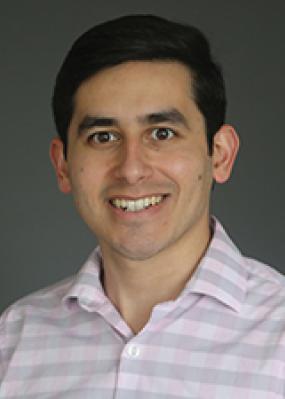Postdoc connects past and present with interdisciplinary research

Rebecca Johnston | Postdoctoral Researcher | Center for Russian, East European & Eurasian Studies / Center for Cyber-Social Dynamics
Rebecca Johnston stays ahead by studying the past.
Johnston earned a bachelor’s in Russian language and literature from Grinnell College. After graduating, she found herself job seeking at the height of the Great Recession. But her decision to study the culture of a country put on the backburner by some policymakers after the end of the Cold War would prove to be prudent.
“I got a job off of Craigslist in October 2009, and the listing was, ‘Do you want to save democracy in Russia?’ It was in all caps, and I thought, ‘I’ve applied for 40 different jobs; I’d better just see what this is,’” said Johnston, a postdoctoral researcher in KU’s Center for Russian, East European & Eurasian Studies (CREES) and the Center for Cyber-Social Dynamics (CCSD).
“And it turned out that it was for a Russian opposition politician named Garry Kasparov.”
At this position, Johnston translated Russian language articles into English for foreign audiences. She added context to the articles, which frequently covered human rights abuses and corruption in the Russian government. She simultaneously pursued a master’s degree in Slavic area studies at the University of Texas at Austin.
“It was a completely different situation than today,” Johnston said. “It was this period when President Obama had pushed for what was referred to as a reset in relations between the U.S. and Russia. There was much less criticism in the Western press of the Russian government. And there was just a completely different public perception; they hadn't invaded Crimea yet.”
After completing her master’s degree, Johnston went to work for the Eurasia program team at Freedom House, a nonprofit that documents human rights concerns around the world. Around 2015, she decided to pursue a doctorate degree in Russian history at UT Austin. Johnston’s previous thesis involved understanding the bureaucracy of Russia’s culture policy. Many countries outside the U.S. choose to publicly finance their creative industries like music and cinema because there is less private investment in non-English language films. Democratic nations try to allow for editorial independence in the art they finance, but autocratic regimes sometimes use this funding to push preferred narratives that support the regime’s policies.
“I said to my advisor, ‘I'm interested in all these different issues, and one thing that I'm sure has already been written about is the historical origins of this cultural bureaucracy and this ministry of culture,’” Johnston said. “She looked at me, and she said, ‘I don't think so.’ So I looked and I was really struck by how much there was a big gap in the literature. That's what I ended up doing my Ph.D. on.”
Now a postdoctoral researcher at KU, Johnston continues to evaluate how the Russian government uses culture to gin up approval of the country’s domestic and foreign affairs, including its current war in Ukraine. She’s currently creating an online map that can serve as a teaching tool to help students understand the way the Russian government uses social media, cinema, and other creative arts as propaganda to promote pro-war narratives and encourage enlistment in its military. She has also authored a chapter on how the government tries to use film to change how Russians understand history and even reality itself.
“When I found this position, it was perfect because what it allows me to do is to look at the relationship between how the Russian government today incorporates history and culture into how they conduct information warfare,” Johnston said.
The position is funded internally by KU’s Research Rising initiative. As the world becomes increasingly complex, research that spans numerous disciplines will be needed to solve its challenges. Johnston notes that the structure of CCSD has already improved her research practice. Following a huge cache of Russian culture ministry files published by the whistleblower organization Distributed Denial of Secrets, Johnston was able to evaluate the documents thanks to collaboration with other KU research staff and faculty.
CCSD Research Program Director “David Tamez put me in touch with somebody in computer engineering who was able to help me get access to those because it was a 468-gigabyte file, but also because it was a leak that came from a Russian government agency in the middle of war,” Johnston said. “There was this warning that accompanies all other leaks that came out around that time that there may be malware or something in this. So you have to be really careful to sandbox it.”
“Everybody in the policy community in D.C. and across the country in academia is trying to develop multidisciplinary research centers these days,” she added. “Everybody knows that that needs to happen, but it's difficult to actually implement in practice in a meaningful way. KU’s efforts are a great example of that happening.”
